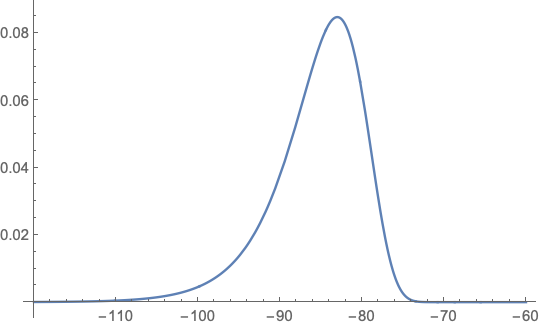I have a derived distribution which I want to play with, which is of the form
$$\frac{1}{\sigma^{2}}2^{-2+\frac{x}{10}} 5^{-1+\frac{x}{10}} e^{-\frac{1}{\sigma^{2}} 2^{-1+\frac{x}{10}} 5^{\frac{x}{10}}}\ln(10)$$
This is a $x \rightarrow 10^{x/20}$ transformation of the Rayleigh distribution, derrived by:
$$R(x, \sigma) = \frac{x}{\sigma^{2}} e^{-x^{2}/(2\sigma)^{2}}$$
and consider $X = 20 \log_{10}(x)$, so $x = 10^{X/20}$. Then
$$R_X(X, \sigma) = \frac{10^{X/20}}{\sigma^{2}} e^{-(10^{X/20})^{2}/(2\sigma)^{2}} \frac{d}{dX}10^{X/20}$$ Plugging into mathematica
10^(x/20)/\[Sigma]^2 Exp[-(10^(x/20))^2/ (2 \[Sigma]^2)]D[10^(x/20),x] gives the top expression.
The function appears well behaved for values I am interested in, here I choose \[Sigma] = 0.00005 which when plotted gives
Plot[(2^(-2 + x/10) 5^(-1 + x/10)E^(-((2^(-1 + x/10) 5^(x/10))/\[Sigma]^2))Log[10])/\[Sigma]^2, {x, -180, -50}, PlotRange -> All]
I want to use this function as a PDF so I can do some analysis I have tried
CustomDistribution[\[Sigma]_] := ProbabilityDistribution[Evaluate[10^(x/20)/\[Sigma]^2 Exp[-(10^(x/20))^2/ (2 \[Sigma]^2)]D[10^(x/20),x]],{x, -Infinity, Infinity}]
Which returns
Function[\[FormalX], (
2^(-2 + \[FormalX]/10) 5^(-1 + \[FormalX]/10)
E^(-((2^(-1 + \[FormalX]/10) 5^(\[FormalX]/10))/\[Sigma]^2))
Log[10])/\[Sigma]^2]
But if I now try and plot this, with the same value for $\sigma$, as
Plot[PDF[CustomDistribution[\[Sigma]]][x],{x, -60, -160}]
I just get a flat line. Am I defining my PDF incorrectly? Is it possible to make a user defined PDF


Plot[(2^(-2 + x/10) 5^(-1 + x/10)E^(-((2^(-1 + x/10) 5^(x/10))/\[Sigma]^2))Log[10])/\[Sigma]^2, {x, -180, -50}, PlotRange -> All]It is defined. Just run it. I will add some text how I derived the expression. $\endgroup$